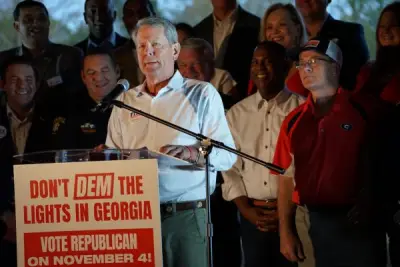Georgia Republicans say they fear local elections could help Democrats in statewide utilities race

Gov. Brian Kemp recently held a rally for the GOP incumbents on the Georgia Public Service Commission. Alander Rocha/Georgia Recorder A unique off-year election for two seats on the Georgia Public Service Commission, a body responsible for regulating utilities in the state, has Republicans vocally concerned, especially considering concurrent municipal elections that they worry could favor Democratic mobilization. Early voting starts Tuesday for the Nov. 4 election, which will decide the fate of two incumbent Republican commissioners on the PSC — Tim Echols of District 2 and Fitz Johnson of District 3 — who are being challenged by Democratic candidates Alicia Johnson and Peter Hubbard, respectively. Fitz Johnson was appointed to the seat by Gov. Brian Kemp in 2021. With the races operating outside the typical presidential or midterm election cycles, attention is low and local municipal races could inadvertently dictate the outcome of the statewide PSC contests, according to experts. District 3 Public Service Commissioner Fitz Johnson. Alander Rocha/Georgia Recorder Democrats are also hoping frustration over rising electricity bills will help motivate voters to turn out, with both Democratic candidates campaigning on utility affordability. Republicans appear to be ramping up efforts to energize their base. Republican Gov. Brian Kemp recently headlined a campaign event in Cumming for the Republican incumbents. Signs at the event said “Don’t Dem the lights in Georgia.” Josh McKoon, the chairman of the Georgia Republican Party, said there was significant concern about Republican voter engagement in the PSC races. He said this election is important for two reasons: the PSC’s role in ensuring reliable energy, which is the “backbone” of Georgia’s economy, and the need to prevent the Democratic Party from gaining a “crack in the door” to the state’s governance. “We have got to wake people up,” he said. McKoon encouraged early voting, saying that “the more early voting we have, the easier it’s going to be to finish the drill and win this election.” He described the election as a “close election” in a “competitive state.” At the top of his speech, Kemp signaled his concerns about low Republican turnout and suggested that apprehension over the coming election drove first lady Marty Kemp to start wearing a shirt with the word “pray” on it. “You hardly even see (Peter Hubbard and Alicia Johnson) out there shaking any hands, asking anybody for a vote. They’re hoping nobody pays attention to this race. They don’t even want people to know that there is a race. That is our biggest liability in this race, as a lot of the speakers have talked about, is that people just don’t know what’s going on,” Kemp said. Echols, who has served on the commission since 2011, acknowledged that Democrats have an advantage due to the numerous municipal elections taking place and, along with other speakers, pivoted to campaigning on cultural issues. He called his opponent, Alicia Johnson, a “DEI specialist” who “wants to bring DEI principles into health care companies, and now she wants to do that at the Public Service Commission.” District 2 Public Service Commissioner Tim Echols. Alander Rocha/Georgia Recorder “She wants to bring DEI and wokeness to the PSC. We simply can’t let that happen, can we?” Echols said. Alicia Johnson, the Democratic candidate for District 2, addressed the attack directly, calling the comments not just a “lie,” but a “racist, MAGA dog-whistle,” saying that her background is at the “intersection of community development, economic development and public policy.” She added that she believes the attack is a sign that the incumbents “are scared.” “I think it really speaks to Tim Echols’ character and his personal values, and that it’s a reflection of him, not me,” Alicia Johnson said. “I’m not just a Black female, but I’m a wife, I’m a mother, I’m a grandmother, I’m a community leader. If he wants to point out that I’ve dedicated my career to helping people, communities and organizations grow stronger and healthier and more resilient, then way to go, Tim.” Public Service Commission candidate Alicia Johnson, a Democrat, qualifies to run earlier this year. Stanley Dunlap/Georgia Recorder Other speakers also resorted to culture war attacks, with Attorney General Chris Carr, who is running for governor, claiming that the “Democratic Party has been taken over by socialists.” Congressman Mike Collins, a U.S. Senate candidate, said that allowing the two Democrats to be elected would bring back “that green new scam of Joe Biden’s America” along with “California values of less power, more brownouts and higher energy.” But despite Republicans’ concerns about reaching voters, Hubbard was the only candidate who participated in a recent debate hosted by the Atlanta Press Club. Hubbard, who debated against an empty podium as Fitz Johnson declined to participate, used the absence of his opponent to launch a direct attack on the incumbent’s record. “My question would be, why didn’t you have the courage to show up today and defend your six rate hikes in two years?” Hubbard asked. Echols and his opponent, Alicia Johnson, also did not participate in the debate. Peter Hubbard at the Atlanta Press Club 2025 General Election debates on October 8, 2025 in Atlanta. Photo credit: J Glenn Photography, courtesy of the Atlanta Press Club. The role of municipal elections Charles Bullock, a political scientist at the University of Georgia, said in an interview that because Georgia still leans conservative, Republicans, who are also incumbents, have a slight advantage. However, he pointed to the general low visibility of PSC races, saying that voters typically don’t know who the candidates are or what the PSC does. Voters in this case are likely to show up to vote for local candidates they know and “tend to fall back on party ID,” Bullock said. “That’s the kind of situation which therefore may create the opening where Democrats could break through and win one or both of these,” Bullock said. Democrats are pledging to be a check on rising utility bills. The current commission has come under scrutiny for approving a series of rate increases requested by Georgia Power. Bullock and fellow UGA political science professor Trey Hood emphasized that the simultaneous municipal elections in cities, typically where Democrats live and contested races are common, can provide a stronger incentive for voters to show up at the polls. “I think the argument about Democrats being somewhat advantaged because of these local elections is probably more correct, or probably has more weight,” Hood said, compared to the argument about voters being dissatisfied with rising energy bills. Bullock said if Democrats were to win either or both seats, “this would be quite inspiring and exciting for them” as they head into next year’s elections, because they may see it as conditions trending in their favor. He said that even if both Republican incumbents win, Democrats could still interpret results as an advantage heading into 2026, where most statewide seats will not have a Republican incumbent running, potentially opening the door for more competitive contests. Voter frustration over utility bills Democrats and energy advocates are banking on voter frustration over rising utility bills helping to energize voters. Charles Hua of PowerLines, an organization focusing on consumer energy issues, said in an interview that nationally, utility bills are the “fastest driver of inflation right now,” adding that utility bills in Georgia “have increased 33% in the last two years, translating to about $500 per year.” Hua said that utility affordability is a “very animating issue right now” and could mobilize voters, but that the challenge is that the awareness of the PSC’s role is not high. Most state agencies across the U.S. that regulate utilities are appointed, unlike in Georgia, where voters can choose each of the five commissioners. “We’re in the homestretch 27 days. What’s possible? Look, I don’t know. We don’t know. We’re going to see this play out … We don’t know what the final turnout number will be because this is the only statewide election you know on the ballot, and most people have not heard of it,” Hua said. Connie Di Cicco, political director for Georgia Conservation Voters, an organization focused on environmental protection advocacy, said the frustration is “almost palpable at this point,” and that she believes that the direct connection between the PSC and bills is a strong mobilizing issue. “Affordability is just a universal issue that a lot of people are feeling all over the state, and that is something that people are very upset about, and literally hits home. So if you’re feeling it and you don’t like it, then you can vote for change and make something happen in November,” Di Cicco said. The post Georgia Republicans say they fear local elections could help Democrats in statewide utilities race appeared first on Rough Draft Atlanta.


